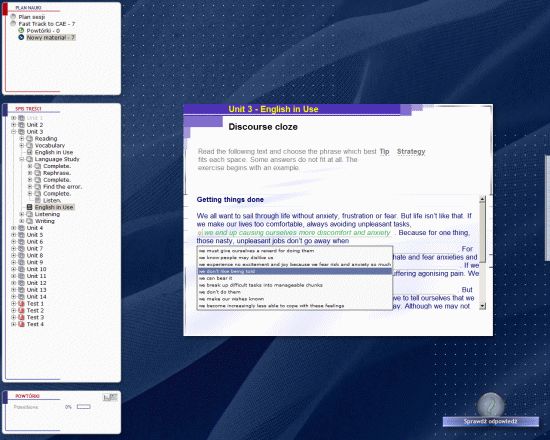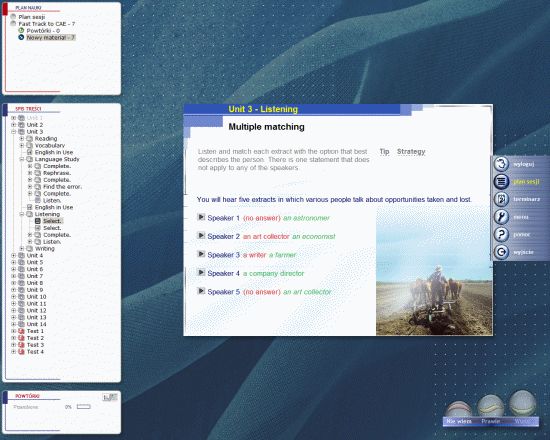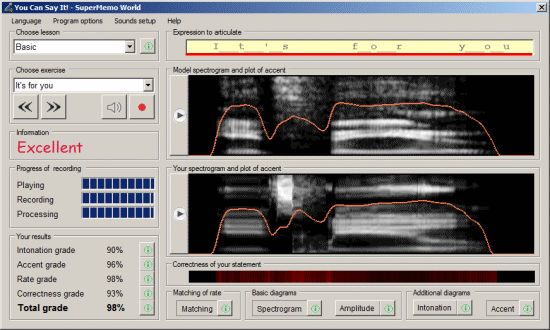- Jan 1, 2014: SuperMemo website addresses will change this year. Please update your bookmarks:
- Super Memory website will remain at the present address at super-memory.com with unchanged focus on SuperMemo, memory, creativity, sleep, etc.
- SuperMemo World's main website will now point to a new server dedicated to serving international users of SuperMemo at supermemo.com
- SuperMemopedia will move to supermemopedia.com (the old clone will remain in place, but will no longer be updated)
- note also that e-mail addresses change as of January 1. Addresses with the [year] label, change the year. New support mail server is located at supermemo.org. If you do not receive a reply or auto-reply within a business day, please see the contact page relevant to your product
- Jan 1, 2013: SuperMemo World launched its first SuperMemo language school in the very heart of Poznan. SuperMemo Language Center combines e-learning language courses at supermemo.net and communication-focused classes organized in small groups. The innovative teaching system at SuperMemo Language Center consists of individually selected classes in small groups, learning with the supermemo.net platform, and unlimited conversation classes
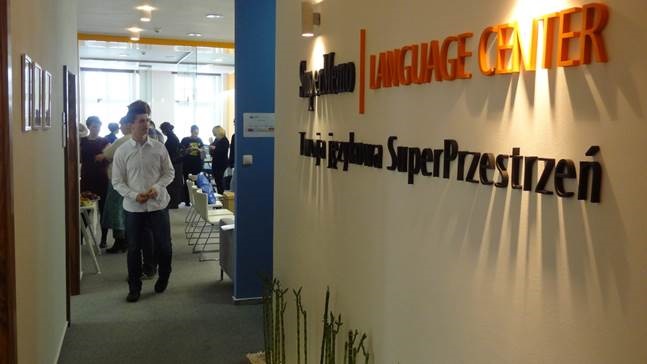
- Sep 1, 2012: In cooperation with T-Mobile, a leading world telecom company, SuperMemo World started the largest ever advertising campaign for SuperMemo and its courses. You could see SuperMemo on TV, on billboards, on the net, and even inside SuperMemo itself popping out via YouTube during your incremental video learning sessions. That must have been annoying! We apologize. All that for a good cause. This campaign made SuperMemo more popular than ever. If Osama hid in Poland, he would not escape SuperMemo in his cave! Exemplary spots: Learn English , Learn Spanish, SuperMemo Mastery, etc.
- Jun 29, 2012 - If you learn English, you will find phonetic transcription of the texts in your learning collection very useful. See how to install the IPA transcription in SuperMemo 15. If you need to add foreign texts or transcriptions to your collection, you will find TypeIt app very useful. It's an ingenious utility for typing characters like � or � in 11 languages, as well as IPA phonetic symbols (e.g. ['ɑːmənd] - [ɔːl mɛn] to distinguish "almond" from "all men"). The solution adopted in TypeIt makes typing unusual characters simple and unobtrusive. You never need to change your keyboard layout. TypeIt uses Unicode and thus works natively with SuperMemo 15.
- Apr 1, 2012 - SuperMemo 15 is the newest version of SuperMemo for Windows. The program was rewritten from the ground up to provide for full Unicode support, and better performance, esp. in text processing operations. For more see: What's new in SuperMemo 15?
- Oct 1, 2011 - 20 years of SuperMemo party.
- Jul 5, 2011 - SuperMemo World is 20 years old today. If you happen to be in Poznan on Oct 1, 2011, please visit us to celebrate. Otherwise you can see a live webcast (Virtual Classroom, Oct 1, 13:00-19:00 CET). See also SuperMemo World at 10 years old: the Decade of SuperMemo and The Decade Interview.
- Apr 5, 2011
- SuperMemo for iPhone topped a few categories of most popular
iPhone apps in Poland (incl. best educational paid and freeware apps).
For a few years now, SuperMemo 98 has occupied the first position
amongst the most popular educational freeware downloads at
Freewarefiles.com. Now, SuperMemo 2004 Freeware has successfully taken over that position with over 100 downloads per day.
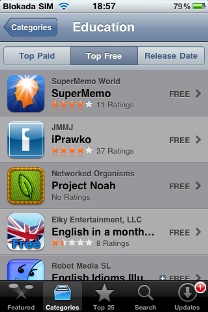
- Nov 9, 2010 - Even though SuperMemo is notoriously difficult to apply universally at younger ages (e.g. in classroom conditions), supermemo.net has been shown to make life easier for kids, teachers and parents. In her thesis, Agata Szofer studies the effects of employing supermemo.net in TEFL for kids in grades 4-6. As in earlier research, it is the logistics, child personality, supervision, and the methodology that determine the outcome of the experiment. SuperMemo and the technology are secondary.
- May 1, 2010 - Polyphasic Sleep: Facts and Myths is now the most prominent and the harshest condemnation of the "Uberman sleep" on the net. In an update, Polyphasic sleep: 5 years later you can read about the impact of the original article, as well as about some curious properties of human sleep. Both articles insist that napping is good, but they clearly separate polyphasic sleep from a healthy biphasic sleep that might be the best sleep pattern for creative individuals. The section titled Circadian timing of naps is your quintessential guide to good napping.
- Mar 17, 2010 - The Sixth International Symposium on the Acquisition of Second Language Speech New Sounds 2010 took place on 1–3 May 2010 in Poznań. The Symposium was organized by the School of English, Adam Mickiewicz University and SuperMemo World was one of the main sponsors
- Feb 25, 2010 - The supermemo.net e-learning platform has received the SCORM 2004 (3rd edition) certificate. With this recent event, supermemo.net is now among very few e-learning systems in the world and the first one in Poland that holds the certificate of the latest and most advanced version of SCORM, 2004
- Jan 20, 2010 - SuperMemo for iPhone is a new member of SuperMemo family
- Aug 31, 2009 - SuperMemo incorporates the entire SleepChart functionality in its latest release: SuperMemo 2008 for Windows. This is the 14th major release of this SuperMemo line in its two decades of existence. In addition to optimizing sleep and circadian aspects of learning, SuperMemo 2008 adds incremental video, visual learning, and a number of enhancements to incremental reading. See: What's new in SuperMemo 2008?
- May 1, 2009 - Gary Wolf's article about SuperMemo was chosen to be included in Best American Science Writing 2009
- Jan 5, 2009 - In December 2008, SuperMemo software was delivered to over 144,000 computers in Polish schools in a tender by the Polish Ministry of Education. Schools were supplied with SuperMemo and language courses for learning English, German, Spanish and French, from elementary to advanced levels.
- Dec 26, 2008 - In the year 2008, SuperMemo UX with English No Problem topped the popularity chart of the best-selling language learning software in the EMPiK network. As a result, it was nominated to the prestigious title of the Ace of Empik in the education&office category. In the end, the title went to MS Office Home Edition.
- Oct 31, 2008 - Newcomers are nearly unanimous, SuperMemo 2006 is unfriendly to beginners. It is complex. It goes against user expectations most of the time. However, SuperMemo 2006 has also traversed a 13-year-long path towards making it more effective and streamlined for a pro user. It has been suggested that video tutorials could provide the shortest path for beginners to appreciate the actual simplicity of various tasks in SuperMemo. We would like to encourage you to submit your own videos to YouTube, as well as to provide feedback and request video tutorials that would make your life easier. See: SuperMemo Theater and Popularity Chart. You can leave your feedback here (registration required)
- Oct 20, 2008 - A prominent memory researcher, Dr Hal Pashler of the University of California in San Diego, speaking to Der Spiegel, described SuperMemo as "probably the best [spaced repetition] software on the market". You can find Hilmar Schmundt's article about SuperMemo on-line: Campaign against forgetting (in German)
- Sep 25, 2008 - Tomasz Szynalski of Antimoon writes about his first encounter with SuperMemo, as well as about his impressions on strange ways of Dr Wozniak
- Sep 15, 2008 - Multimedia learning courses with SuperMemo UX are at the top of best-selling items in the entire SuperMemo spectrum, while SuperMemo UX competes for the top rank in user friendliness. To get a taste of SuperMemo UX, you can now download free (23 MB) and give it a ride. See also: demos (313 MB).
- Jul 23, 2008 - Chris Khoo from Brisbane, Australia, is 26-year-old. He has been using SuperMemo for only a few months. Here are some of Chris Khoo's impressions about SuperMemo.
- Apr 21, 2008 - Why is adoption of SuperMemo so slow? Writing for the cultish Wired Magazine, Gary Wolf attempts to answer this question with his own philosophical angle. Renowned for his bare-knuckles analyses of maverick genius minds such as Ted Nelson, Ray Kurzweil or Steve Wozniak, Wolf interviewed scientists, developers, and educators involved in theoretical and practical aspects of memory and learning. Then he focused on people who made SuperMemo happen: Dr Wozniak, Krzysztof Biedalak, Dr Janusz Murakowski and more. Read: Surrender to this algorithm
- Mar 31, 2008 - Skype needed 3 years to reach their first 5 million users in 2006. Napster needed just 6 months back in 2000. Netscape 7.2 took a bit over 2 months to reach 5 million downloads in 2004. Many Internet startups nowadays need just a week to get to 5 million registrations. In the meantime, SuperMemo needed exactly 20 years to get to the currently estimated 5 million users. The good news is: the number keeps growing.
- Dec 13, 2007 - SuperMemo 1.0 for DOS was written 20 years ago today
- Nov 20, 2007 - We have developed basic tools needed to investigate the link between sleep and learning! For the first glimpse at the data see: How sleep affects learning. If you use SuperMemo 2006 and SleepChart, you can submit your data today, and get a personal analysis free of charge. This is your first-ever opportunity to have a detailed look at how your own sleep habits affect your learning! See: How to submit your data. Send your data promptly as the number of reports that can be compiled is limited
- July 16, 2007 - If you would like to participate in a research program intended to investigate the relationship between sleep and learning, start using SuperMemo 2006 and SleepChart freeware today! More details and an invitation to participate in the program will be published in this news section later this year. If you do not have SuperMemo, download SuperMemo freeware. Note, however, that only SuperMemo 2006 registers the exact time of each repetition. This means that, for earlier versions, only a subset of the full suite of correlation procedures can be executed for you
-
Apr 1, 2007 - As early as in 1991, SuperMemo was supposed to help
you achieve "maximum possible speed of learning". In
those days, the repetition
spacing algorithm was accurate enough to leave little room for further
improvement. However, every couple of years, new developments resulted in
new announcements coming from SuperMemo World: Now you can learn yet
faster!
Year 2007 brings one more of those optimistic proclamations. Newly released SuperMemo 2006 claims: You can now increase the volume of learning, and yet increase the retention of your top priority material. Does it seem to defy the laws of memory? Is there a catch? To find out, read: Priority Queue in SuperMemo 2006.
For those who are not interested in incremental reading, SuperMemo 2006 brings several other improvements. See: What's new in SuperMemo 2006? (users of previous versions can upgrade at just 33% of the list price) - Mar 5, 2007 - SuperMemo 4.0 for Pocket PC supports landscape mode and includes several layout, import and export enhancements. Users of versions 3.xx can upgrade free (download). Users of version 1.xx and 2.xx can upgrade at half price (note that this line will now solely support XScale processors)
-
Feb 28, 2007 - "Simplicity, neat interface, and powerful
presentations"... these are the qualities enjoyed by users of the
first courses powered by SuperMemo UX: Fast
Track to CAE and Mit Erfolg zum Zertifikat Deutsch:
- Dec 4, 2006 - If SuperMemo for Windows is too clunky, you can learn on the move with SuperMemo in your pocket
- Nov 24, 2006 - You can come and see SuperMemo.NET at Online Educa in Berlin, Germany (Nov 28 - Dec 1, 2006). SuperMemo.NET is an open e-learning service. SuperMemo.NET hosts a number of courses, mainly for learning languages. SuperMemo World works with corporations, schools, portals and publishers in providing its CAL technologies to improve training of their employees, students and customers
- Nov 15, 2006 - SuperMemo UX is a new version of SuperMemo
that will run in Windows. UX stands for User eXperience. It will replace
the terminated line of Multimedia SuperMemo that has been used for
licensing and off-line publishing. HTML-based SuperMemo UX will allow of full data exchange with
SuperMemo.NET. SuperMemo UX will be available with an external editor to publishers wishing
to use SuperMemo as their course publishing engine. First ready-content publications shall be available
soon with learning and exam
simulation content preparing for international language certificates: CAE
prepared in cooperation with Pearson Education, and Zertifikat Deutsch prepared in cooperation with Ernst Klett
Verlag. The same courses shall be also available in SuperMemo.NET.
Selected features of SuperMemo UX:
- intuitive, graphical interface, consistent with SuperMemo.NET feel and look
- new functions facilitating the selection of learning material, entering and disabling repetitions
- predefined test and examination templates
- handling of multiple users
- automatic on-line update
- Windows Vista compatibility
-
Jul 12, 2006 - SuperMemo for Pocket PC ver. 3.6 is available free for users of versions 3.0 thru 3.5. The update is only relevant for PocketPC 2003 and Windows Mobile 5.0. The most important improvements involve handling of sound (wav and mp3) and animations (wmv) in HTML
-
Jul 5, 2006 - SuperMemo World is 15 years old. No celebrations. Just another day in the office.
-
Mar 29, 2006 - Users of SuperMemo for Palm OS can now upgrade to version 2.0:
-
XML: separate tool for SuperMemo XML import/export expected shortly (Q2 2006). It will be free for all users of SuperMemo for Palm OS
-
customers who purchased version 1.1.1 or 1.1.2 in 2006 can receive their upgrade free (to obtain it, please write)
-
Mar 18, 2006 - Supermemo.net is currently the fastest growing SuperMemo. If you would like to implement a universal, platform-independent, reliable and cheap learning solution in your company, institution or country, use this form. We seek publishers, authors, portals, and training companies ready to capitalize on the growing power of supermemo.net. See some exemplary implementations (incl. the largest Polish internet portal running courses based on SuperMemo). Never heard of supermemo.net? You can sign up today and see it for yourself
-
Jan 18, 2006 - Over the last 5 years, there has been an unprecedented explosion of new findings in sleep research affirming the central role of sleep in learning. At the same time, a worrying trend germinates on the Internet. A powerful meme of "da Vinci sleep", currently mutating as "Uberman sleep schedule" is captivating young minds looking for more "juice" in life at the cost of sleep. Recently, "Uberman schedule" has even hijacked a scientific concept of "polyphasic sleep" to assume a veneer of validity. If you have heard of the idea and consider "enhancing" your life with a "better" sleep strategy, read about the cruel myth of polyphasic sleep. Otherwise, read the counter-prescription of free running sleep
-
Oct 24, 2005 - During power outages in Florida resulting from Hurricane Wilma, Verio's backup power generators at Boca Raton have failed. As a result two SuperMemo servers have been down for 22 hours (supermemo.com and super-memory.com). This also affected mail delivery to and from supermemo.com domain. Customers who failed to receive a response to their orders or inquiries are kindly requested to send a notification or resend their mail. We sincerely apologize for this inconvenience
-
Aug 25, 2005 - SuperMemo turned 20 years old today. Its first shaky steps were described in Chapter 3 of Optimization of Learning
-
May 20, 2005 - A better model of the memory consolidation process opens a way to a simpler algorithm for spaced repetitions. See: Building memory stability through rehearsal
-
May 7, 2005 - In a tradition dating back to 1991, older versions of SuperMemo are being released in regular intervals as freeware. The newest member of this freeware family is SuperMemo 98 (download from Freewarefiles.com). Previously released versions are: SuperMemo 2 (1991), SuperMemo 5 (1993), SuperMemo 6 (1995), and SuperMemo 7 (1999)
-
Apr 12, 2005 - Users of SuperMemo 2004 can now re-download an updated version of the program that fixes nearly a hundred problems reported in the course of gamma testing. To update, re-run the installer downloaded while purchasing SuperMemo 2004 (the default file name is: sm04inst.exe). Important! Before you re-run the installer, back up your SuperMemo folder and your learning material! See also: Bugs fixed
-
Mar 18, 2005 - Advanced English is the most popular learning material created for SuperMemo. Multimedia SuperMemo is the most widely distributed version of SuperMemo ever. These two have now been combined with a new set of 80,000 audio recordings to produce Extreme English DVD
-
Sep 4, 2004 - Enthusiast of incremental reading can now upgrade to the newest incremental reading machine: SuperMemo 2004 for Windows. SuperMemo 2004 adds a number of improvements that make incremental reading smoother than ever (see: What's new in SuperMemo 2004?). In addition, it is a second SuperMemo line to join the XML Club (see: Revolution in the pocket). This means, that for the first time ever, users of incremental reading can drill their items in all conditions where they can squeeze in with a Pocket PC device
-
Jun 11, 2004 - Users of SuperMemo for Pocket PC can now upgrade to version 3.0. New features in SuperMemo for Pocket PC include:
-
HTML formatting
-
first core implementation for inter-platform learning XML data exchange
-
the limit on the length of questions and answers has been eliminated
-
a database can now hold up to 30,000 items
-
different fonts in questions and answers can be saved in the database configuration file
-
two modes of character encoding: compressed Unicode (for compatibility) and UTF-8
-
global swap of questions with answers
For more information see:
-
Download a trial version of SuperMemo for Pocket PC
-
Revolution in the pocket (how XML will impact data exchange between SuperMemos)
-
How to register, upgrade, update, or unlock SuperMemo for Pocket PC
SuperMemo for Pocket PC 3.0 presenting the use of HTML:
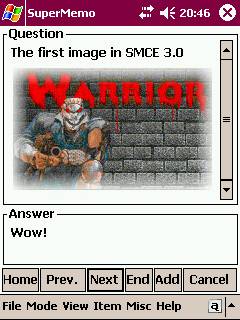
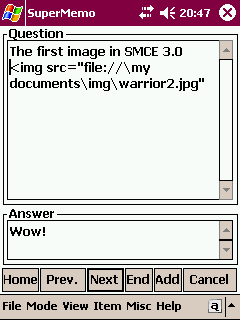
SuperMemo for Pocket PC 3.0 presenting material imported from SuperMemo for Windows via XML data exchange:

-
-
Apr 6, 2004 - Due to rampant spam and proliferating mail viruses we were forced to proceed with a new series of mail address changes. Most significantly, the address wired in SuperMemo for Windows, support@supermemo.com had to be cancelled as the number of pieces of spam reached 1000 per day. More and more legitimate mail had been overlooked. You can always find the newest address at Support Page. We apologize for this highly inconvenient change. For the list of current addresses see: Contact. In addition, all addresses at SuperMemo Library have been changed. See: Library Contact
-
Mar 12, 2004 - A new user community has been proposed by Matthias Hamann. The community includes the section for SuperMemo collection exchange: http://www.supermemo.edu.tf/
-
Mar 1, 2004 - Every year there are more SuperMemos to choose from. Until now, all SuperMemos communicated using a primitive question-and-answer data exchange format dating back to SuperMemo for DOS (1988). The format would not even transfer the learning process! This is all about to change with the arrival of a SuperMemo XML data exchange specification. The concept is far from complete, but rudimentary implementation of its core functionality has already begun on several platforms with SuperMemo for Windows, SuperMemo CE and SuperMemo Library in forefront. SuperMemo for Palm Pilot and on-line SuperMemo are to follow soon after. The data format is also suitable for SuperMemo-less presentation (e.g. on the net). See also exemplary XML and XSL files viewable in Internet Explorer 6.0. To comment on the concept, contribute to its final shape or to proceed with your own implementation have a peek at: SuperMemo XML Alpha
-
Jan 24, 2004 - Electric lighting, TV, computer games, the Internet and the 24-hour economy resulted in an epidemic of sleep disorders in industrial societies. The amount of caffeine consumed and all-nighters pulled at college campuses translate into untold losses to learning and creativity. Instead of the New Renaissance or New Enlightenment, we seem to be heading more towards a New Rat Race with grumpy citizens, sleepy students, road rage, family violence, substance abuse and the like. One of the major causes of the unfulfilled promise of new cyber-society comes from the clash of the technology with human biology. We have not yet learned how to adapt our bodies shaped by thousands of years of life in primordial conditions to the new lifestyle determined by our ambitious goals and societal pressures. If only we could all sleep well, love what we do, love each other, and smile more, we would have made a major step on a way towards a higher level of human growth and development. In continuation of Good sleep, good learning, good life, we would like to present to you SleepChart, a freeware software application for optimizing sleep and diagnosing sleep phase disorders. In the article Formula for Healthy Sleep, we try to demonstrate that by tracking two variables underlying the sleep rhythm, we can come closer to understanding when we need to go to bed so as to maximize the benefits of sleep for learning and creativity
-
Sep 24, 2003 - A few new upgrades and add-ons for users of SuperMemo:
-
SuperMemo for Pocket PC ver. 2.5: compatible with Pocket PC 2003, including large window mode (without statistics), and replacing Convert Tables with Q&A export/import directly via Unicode. This upgrade is free for all users of previous versions of SuperMemo for Pocket PC. Please reorder (no charges on repeat Pocket PC purchase) or write to shop(AT)supermemo.com to request a copy
-
Tools : Plan timer for SuperMemo 2002 makes it possible to time your activity with SuperMemo schedule manager even if SuperMemo is not running. If you would like to have this feature integrated in future versions of SuperMemo for Windows, write to support(AT)supermemo.com
-
Knowledge Harvester - conveniently automates copy/paste operations when reading texts and preparing simple Q&A collections for various SuperMemo platforms (please visit and support http://www.banaban.net)
-
-
Sep 23, 2003 - We regret to inform that Video English and Cross Country CD-ROMs will no longer be available. Due to the expiry of the original licensing agreement and the depletion of the current stock, we are unable to continue sales. Please write to library(AT)super-memory.com to learn about the currently available alternatives. Also, Multilingual SuperMemo CD-ROM has been terminated due to the lack of customer interest. MegaMix 99 CD-ROM provides an up-to-date super-set of this old title (with SuperMemo 7 replaced by SuperMemo 98)
-
Aug 25, 2003 - Visitors to supermemo.com often ask for an evaluation of various learning methods such as Photoreading, mind maps, NLP, Mega Memory, Silva Method, speed-reading, Precision Teaching, or binaural beats. It is impossible to give all methods a fair treatment. However, to help you separate diamonds from the chaff, you may wish to read: 20 Myths of Memory and Learning
-
Aug 22, 2003 - Due to the sobig.f attack some of mail received in these days at various SuperMemo-related addresses might have been overlooked. If you do not receive a response within 3-4 days, please resend your inquiry
-
Jul 24, 2003 - Due to a spam explosion on July 4-7, 2003, it is possible that some messages arriving to support AT supermemo.com on that day might have been lost. If you have not received a response to your queries, please resend them. We apologize for this inconvenience.
-
Apr 14, 2003 - Several e-mail accounts at supermemo.com have been deleted due to heavy spam. Please see contacts for the up-to-date list. Most importantly order@ has been replaced with shop@. Mail sent to non-existent accounts will be deleted on arrival.
-
Mar 13, 2003 - Two new freeware collections in SuperMemo Library illustrate two different and important angles of learning with SuperMemo:
-
Phonetic system for memorizing numbers - Greg Reppas shows you how to memorize numbers. You may need a major investment in understanding and perfecting the method, but once you master a solid mnemonic technique, remembering numbers will always be easy
-
Learning English with movies - if you like movies, this collection might be the most entertaining part of SuperMemo Library. You can extend it easily with material from your favorite movies
-
-
Feb 20, 2003 - User surveys indicate that templates and categories give users of SuperMemo 2002 most headaches. The following article addresses this problem in a no-frills manner: Working with Templates and Categories
-
Jan 22, 2003 - We would like to hear from users of SuperMemo for Windows if they prefer SuperMemo delivered as a plain zip file, as a self-extracting zip file, or along a standard Windows installer. Users with advanced computer skills prefer zip files; however, SuperMemo seems to attract more and more users who are not very fluent with files and folders. This beta-testing program illustrates a no-hassle setup alternative (all registered users can join this testing program). See the installation flow-chart
-
Jan 1, 2003 - In case you are still in doubt: you can improve your memory skills by training
-
Dec 31, 2002 - Do you party tonight? SuperMemo Library provides an alternative: start 2003 on a good foot with a dose of learning. A dozen new collections include lots of fun learning material. Here are some examples:
Bones of the skull

International Phonetic Alphabet

Polish voivodship capitals: in the picture below: Poznan, the birthplace of SuperMemo

-
Dec 2, 2002 - Dr Len Budney, a US user of SuperMemo, set up SuperMemo Wiki. You can contribute to building user community encyclopedia about memory, learning and creativity. You can easily add your own articles (see example), or improve upon the work of others (see example). Just go to any page and click Edit at the bottom. It should take you no more than 5 min. to register and 20 min. to learn how to add your own material.
-
Dec 1, 2002 - If you hate Microsoft, and if you are angry with their pushing Internet Explorer on you, consider the good side. Without Internet Explorer there would be no HTML-based incremental reading in SuperMemo. Microsoft integrated HTML parsing and rendering with many of their products. This could have been part of their browser war, but it is also a logical step in the operating system development. HTML is so universal, that an operating system without HTML processing would lag behind today's user demands.
SuperMemo employs mshtml.dll library that makes it possible to do HTML editing. SuperMemo can now render HTML in exactly the same way as it is done by Internet Explorer. mshtml.dll might be one of the buggiest components in Windows; however, for SuperMemo is has still been a blessing. If you are interested in the subject here are some links:-
MSHTML Editor in Delphi - SuperMemo collection we used to learn about WebBrowser control during the implementation
-
MSHTML Editor in questions and answer - text version of the same material importable to your SuperMemo
-
SuperMemo source code - which reveals SuperMemo inner implementation, as well as the pains due to bug workarounds (see also: fast HTML search&replace in SuperMemo)
-
-
Nov 14, 2002 - Incremental reading is the most important enhancement to SuperMemo since its inception in 1987. Yet few people know what incremental reading is. Yet fewer are able to successfully employ it in their daily learning practice. Incremental reading can shortly be described as reading&repetition. You just take an article and keep on reading it (in the same way as you read it in your web browser). However, while reading, you tell SuperMemo, which portions of text are important. All you need for that is: select&click. SuperMemo will present those portions to you at later time for further analysis. That's the essence of incremental reading!
When you read important fragments, SuperMemo helps you convert them to question-and-answer material with a single click. For example, you read that Neolithic diet increased the rate of infectious diseases. With a single click you convert that to a question: Neolithic diet [...] the rate of infectious diseases. It is the job of SuperMemo to handle the flow of articles, their fragments and questions. Every day, you get your dose of reading and repetition. SuperMemo tries to maximize the retention of your new knowledge (i.e. make sure you remember what you learn). That's all.
Some articles are suitable for incremental reading (e.g. encyclopedic material), others are not (e.g. fiction). To help you inspect the incremental reading process in action, we have prepared for you this collection: JavaScript Tutorial. This tutorial is based on excellent materials available from http://www.w3schools.com. This material is ideal for incremental reading: concise and meaty. Except for cosmetic edits, the whole collection was made by paste&extract. No typing needed!
Go to Contents in the JavaScript collection and see how individual portions of text imported from w3schools get portioned and converted to question-and-answer material. If you are interested in JavaScript, click Learn and see the outcome of the incremental reading process (around 500 elements have already been generated in the collection). Note that the deeper you go into the course, the less processed the material is. That is the norm in incremental reading. This is work in progress and the progress is incremental. Every day you go deeper, focus on more detail, and learn more. To complete the course, go to w3schools, import more pages and process them using the incremental reading technique. For technical details see: Incremental reading. For a longer article about the role of incremental reading in learning see: Devouring knowledge. You can also consult Incremental reading FAQ.
-
Nov 9, 2002 - Do you think SuperMemo is complex? Let two Irish teenagers explain how they incorporated SuperMemo into their daily learning routine: Introduction to SuperMemo 2002. You can also see an exemplary free collection developed by the same authors, which illustrates that learning is fun: Spanish Alphabet for Kids
-
Nov 4, 2002 - In the world of global communications, excellent English is no longer a trump card. It is a live or die factor. Demand for English courses is soaring. That's why Advanced English flagship sails on; by far the most popular collection in SuperMemo Library.
Advanced English is likely the fastest way towards beating native speakers (as well as your ESL friends) in mastering English. This can be measured objectively by GRE, FCE or TOEFL scores! In addition, Advanced English is the best introduction to the world of SuperMemo. You can get the feel of the program while building a solid knowledge of English vocabulary and grammar. Today, you can finally download the entire Advanced English material from the net. It includes 41,000 elements and 27,000 sound recordings. If you still do not have SuperMemo, you can go straight for the Advanced English 2002 Power Pack, which includes: SuperMemo 2002 (2MB), Advanced English 2002 collection (10 MB) and Audio material (230 MB). In addition you can opt for a whole suit of discounts, upgrades and cross-sale options for existing users. For details see: Advanced English 2002
-
Nov 1, 2002 - In a rare departure from the learning-oriented subjects, we would like you to delve into the matters of ethics. In these days where evil takes more and more sophisticated form, we would like you to consider this arguable thesis: Knowledge is Good!
-
Oct 19, 2002 - Mail Server Crash! If you have not received response to mail sent to SuperMemo World in recent days, please resend! Due to an unexpected surge in spam (80,000 messages within a single day), the mail server at supermemo.com crashed and all mail has been lost. We apologize for this inconvenience. Frequent problems related to mail delivery:
-
Users who do not receive a response once, wrongly assume we are unresponsive and give up
-
Users keep on sending mail with a wrong return address and we are unable to respond
-
Users use faulty mail accounts and all mail bounces back
-
Rarely, legitimate mail is mistakenly filtered as spam or not delivered at all
-
Mail is sent to addresses that have been eliminated due to spam and redirected to devnull(AT)supermemo(.)com. This mail is deleted upon arrival
In most urgent cases, where we cannot contact you by mail, we will resort to using the phone (if available on the record). If that fails, paper mail is used as a last resort.
-
-
Oct 7, 2002 - Users in North America can now get improved performance with supermemo.net located in the US
-
Aug 1, 2002 - www.antimoon.com is an interesting site for enthusiasts of English. It provides hints and tips for learning foreign vocabulary. It also discusses optimum strategies for using SuperMemo. Two interesting articles:
-
"Me and SuperMemo" by T. Szynalski is an encouraging story of how young talent gets hooked on SuperMemo. The author probably gives SuperMemo more credit than deserved. It is the passion for learning, which emanates throughout the article, that is the first and foremost pre-condition of great knowledge. Luckily, it is the passionate student who is also more likely to appreciate the value of SuperMemo
-
"Sentence items" describes a formulation strategy for learning vocabulary in real-life contexts. This strategy does not entirely comply with the minimum information principle central to SuperMemo. The authors probably again underestimate the power of passion. Passionate students who formulate their own "sentence items" are bound to be successful. However, those who reuse similar material might find it much harder to accommodate. The problem will be compounded with lesser motivated students. In contrast, Advanced English material has been formulated with strict adherence to the minimum information principle. All students should try all suggested approaches to find the optimum strategy matching their own level of passion for the language
-
-
July 3, 2002 - With 3000 ideas on the implementation tasklist for future development on the Windows platform alone, you may think your feedback will easily get ignored. The reverse is true, the future directions are largely driven by the user community. Send your ideas via e-mail. None gets ignored. Here are some links:
-
user-made mind map with new ideas for future SuperMemo
-
-
June 1, 2002 - The newest SuperMemo for Windows makes it easy to harvest knowledge directly from the Internet:
-
Order SuperMemo 2002. If you own an earlier version, you can upgrade (60% discount)

Fig: SuperMemo 2002 makes it easy to import directly from the web
Main advantages of SuperMemo 2002:
incremental reading in HTML (WYSIWYG import from the Internet)
wholesale import of web pages from Internet Explorer
pre-exam review (based on the concept of a mid-interval repetition)
AND/OR/NOT search
daily learning graphs showing user's progress
wizards for categories, tasklists and material rescheduling
Main disadvantages:
SuperMemo 2002 requires Internet Explorer 6.0
SuperMemo 2002 requires the newest Windows (2000/XP recommended). See: Minimum requirements
Upgrade to SuperMemo 2002 is irreversible
SuperMemo 2002 will attempt to inactivate older version of SuperMemo that run on your computer (to make sure you do not attempt to open new material with older versions)
-
May 28, 2002 - Could using SuperMemo result in damage to your memory? See: Can too much learning lead to Alzheimer's?
-
May 25, 2002 - Users of SuperMemo 2000 can download a free update that eliminates four most painful bugs found in earlier releases. Most important bugs removed from Build 10.10:
-
Regroup in folders bug that could delete some non-empty elements
-
problems with OLE in elements with Scaled on
-
incomplete Trim Shortcuts
-
wrong average forgetting index statistic
-
-
Apr 28, 2002 - There has been a debate raging for ten years whether users of SuperMemo will ultimately prefer to develop their own learning material or prefer to use a ready-made material. One extreme view is that users do not have time to formulate their own learning material. They want a ready-made package. SuperMemo's competitors on the education market prevalently (but not exclusively) adopted the ready-made paradigm with excellent results. SuperMemo was initially stuck with do-it-yourself option that is certifiably better for long-term recall. By 1995, it became obvious that ready-made material option requires the highest quality content. With high quality content, more and more users started buying SuperMemo as part of a package for learning a specific subject (e.g. English, Traffic Regulations, etc.). In 2000, the balance again seemed to swing towards do-it-yourself. Incremental reading encouraged many to create their own collections. Incremental reading replaces typing with the import of ready-made pages selected by the user (e.g. from the web). These pages are processed with a few clicks into questions and answers. Perhaps this helps explain why SuperMemo Library covers only a small proportion of registered users. In the new quiz above we would like to know how we could increase the popularity of SuperMemo Library, and the use of ready-made material available therefrom
-
Apr 16, 2002 - Dr Len Budney is a US user of SuperMemo. His website includes a couple of well-written stories that look at SuperMemo from user's perspective. In a vivid and simple language, Budney's website explains incremental reading as well as tasklists. The article entitled "My Experience Using SuperMemo" illustrates how the new economy will reward science-oriented minds equipped with good background in math and logic. The article also illustrates how SuperMemo helps you cope with the weaknesses of forgetful memory. Budney writes: "SuperMemo is not magic. If I had relaxed my discipline [...], I would almost certainly have failed [...]"
-
Apr 15, 2002 - The new Polish SuperMemo Website includes a few CD-ROM products based on the new Multimedia SuperMemo with screenshots illustrating the "new look": Spanish, French, Orthography, Tax Advisor Course, and First Certificate in English. The latter CD-ROM has been chosen the 3rd best multimedia CD-ROM product in Poland in the year 2001 (Chip Magazine). In the picture below: "Espa�ol para ti" in Multimedia SuperMemo:
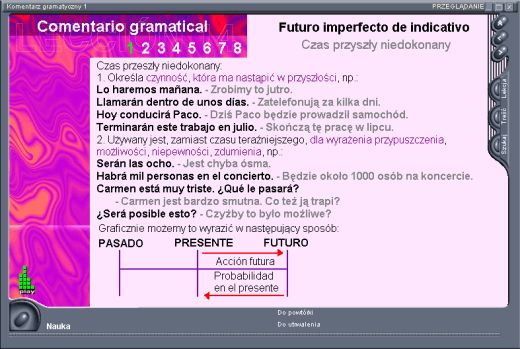
- Mar 12, 2002 - If you have problems accessing pages devoted to
SuperMemo CE today, please come back later. Those pages are located on a
lower performance server and might be overloaded due to the appearance of
an article about SuperMemo CE in the Pocket PC Magazine. In the
meantime you could visit alternative pages:
- SuperMemo CE Help
- Pocket PC Magazine Article
- Feb 18, 2002 - "People Who Sleep Less Live Longer"
screamed news headlines around the world last week. The reason: a new
large-scale study by researchers from the University of California at San
Diego who found that people averaging 8 or more hours of sleep per night
were 15% more likely to die within the 6-year period of the study than
those who slept seven hours (Archives of General
Psychiatry). The study makes a valuable contribution to our
knowledge of sleep habits but conclusions amplified by mass media are not
only wrong. They are dangerous! If you decide to cut down your sleep today
to live longer, you will certainly achieve the effect opposite to the one desired.
It is your body (actually the brain) which knows best how much sleep
you need. This might be five or it might be nine hours. We differ a lot in
that respect. There are no noteworthy benefits of cutting down your sleep
with an alarm clock, and the dangers are well documented. The erroneous
conclusion media draw from Dr Daniel Kripke team study comes from a
typical cause-effect relationship confusion. It is not that long sleep is
detrimental. It is more that poor health may increase the demand for
sleep. Driven to extremes, comatose and bed-ridden patients will bias
similar statistics. People with poor quality apneic sleep are more likely
to linger in bed and report long nights. On the opposite side of this
spectrum are people with healthy and sound sleep habits that often feel
refreshed with as little as five hours of sleep, and wake up naturally
before the alarm time. In addition to having adverse health effects, sleep
deprivation is a major cause of traffic accident and causes immeasurable
damage to nations' creative potential. Even the alertness test is not
likely to testify to your sleep's quality. This comes from the fact that
stress hormones often mask sleep deprivation. You will achieve best health
by getting as much sleep as your body calls for in conditions that
eliminate stress, stimulants, anti-depressants, sleeping pills and the
like. Once more, the mass media amplifier is likely to produce confusion
and negative ripples that will keep on reverberating for years to come.
Hopefully, that won't be the case with users of SuperMemo and accidental visitors to this
website who read: Good sleep for good
learning. Here are some of the last week's headlines:
- Study Links 8 Hours' Sleep to Shorter Life Span (Washington Post)
- Are Snoozers Loosers? (CBS News)
- People Who Sleep Less May Live Longer (MSNBC)
- People Who Sleep Less Live Longer (Yahoo News)
- Oversleepers may die early (Nature)
- Jan 14, 2002 - Although we would like to think of users of SuperMemo as the cream of the crop of intellectual elite, they represent many walks of life and countless personality profiles. This is a constantly growing community, which increasingly reflects a typical cross-section of modern society. However, it seems still possible to plot a typical path a user traverses from her first encounter with SuperMemo to the point when she joins a die-hard group (which, naturally, not always is the case). The first impressions of SuperMemo are usually positive as many users come to supermemo.com from a friend's recommendation. With a dose of studying the concept, SuperMemo gains more points. However, the first impressions delivered by software itself are not so positive. The program seems complex and unintuitive (esp. SuperMemo for Windows). Usually there is a clash between what users expect and what SuperMemo really is. Many start from building complex mind maps, playing with fonts and colors, or building extensive knowledge tree. Here SuperMemo stubbornly refuses to adjust to user's concept of what the efficient learning process is. Documentation is not of much help as it is also molded towards SuperMemo-centric worldview. Luckily, with passing weeks and months, users gradually discover workarounds to their problems. They learn tricks of the learning trade. The learning becomes first enjoyable and then addictive. We spare no effort to reduce the first-contact stress barrier. New releases always strive at covering up for insufficiencies and disappointments of the previous ones; in terms of simplicity, functionality and documentation. Before you see more of this effort, help us by taking part in the quizlet: What annoys you most about SuperMemo?


